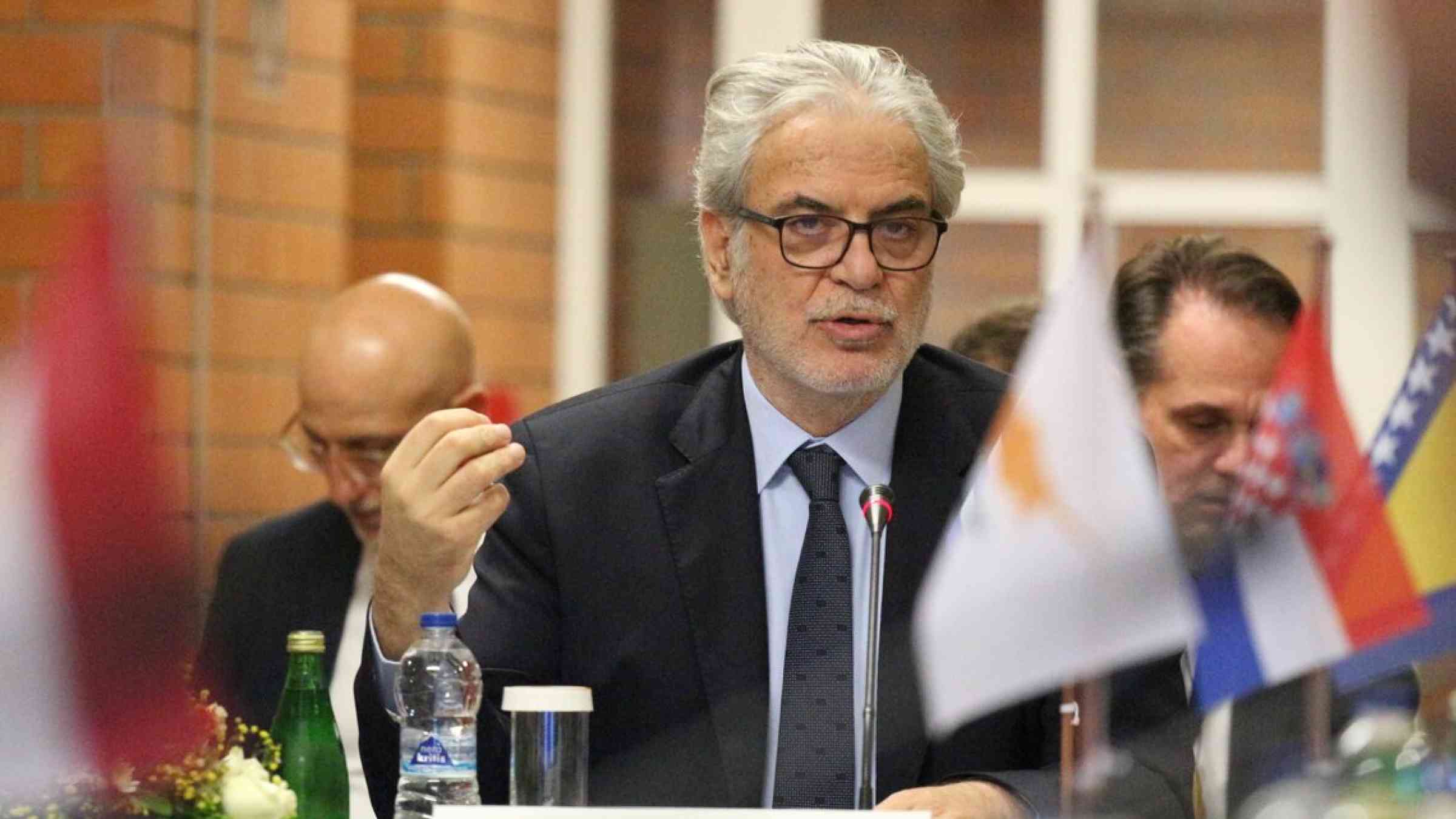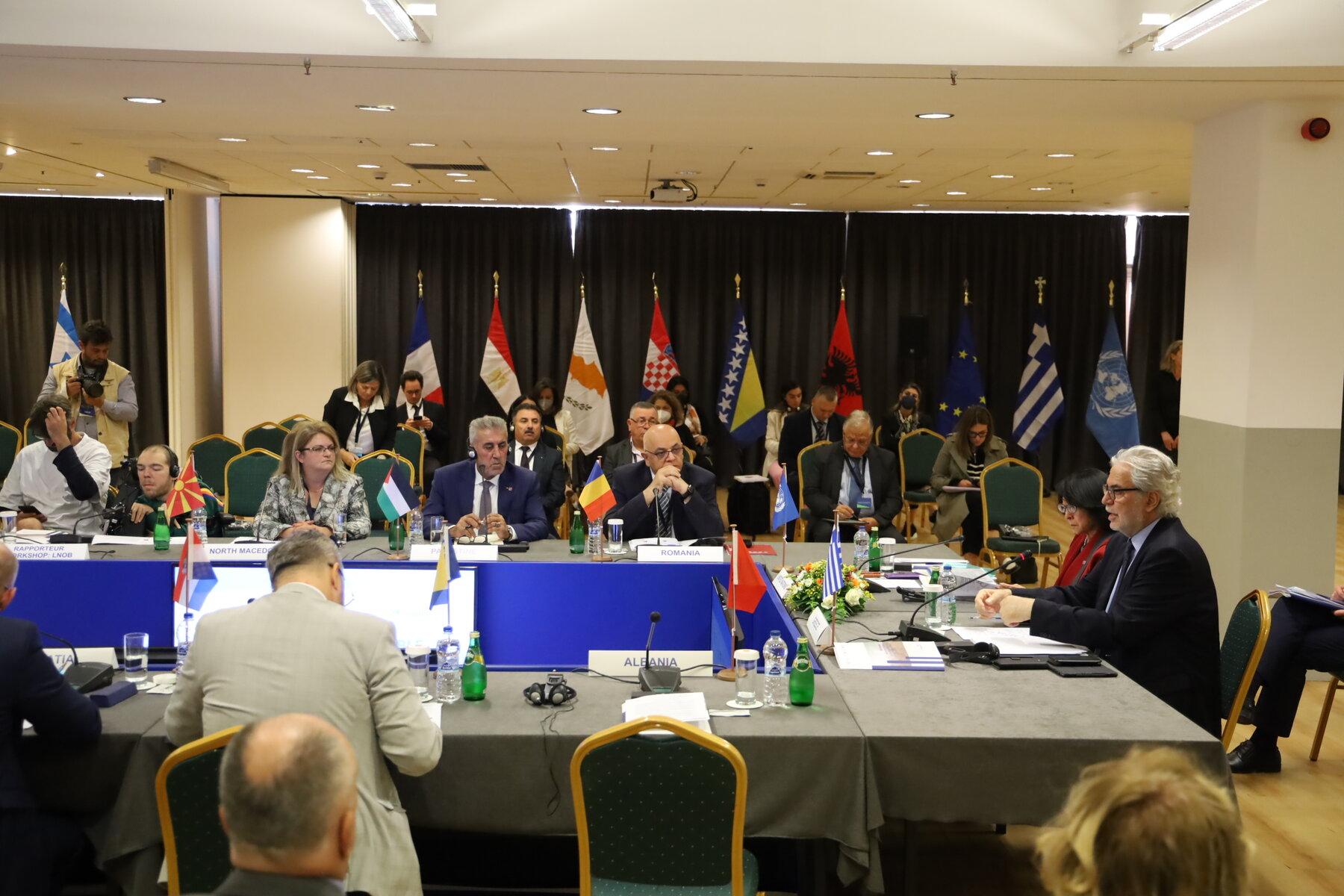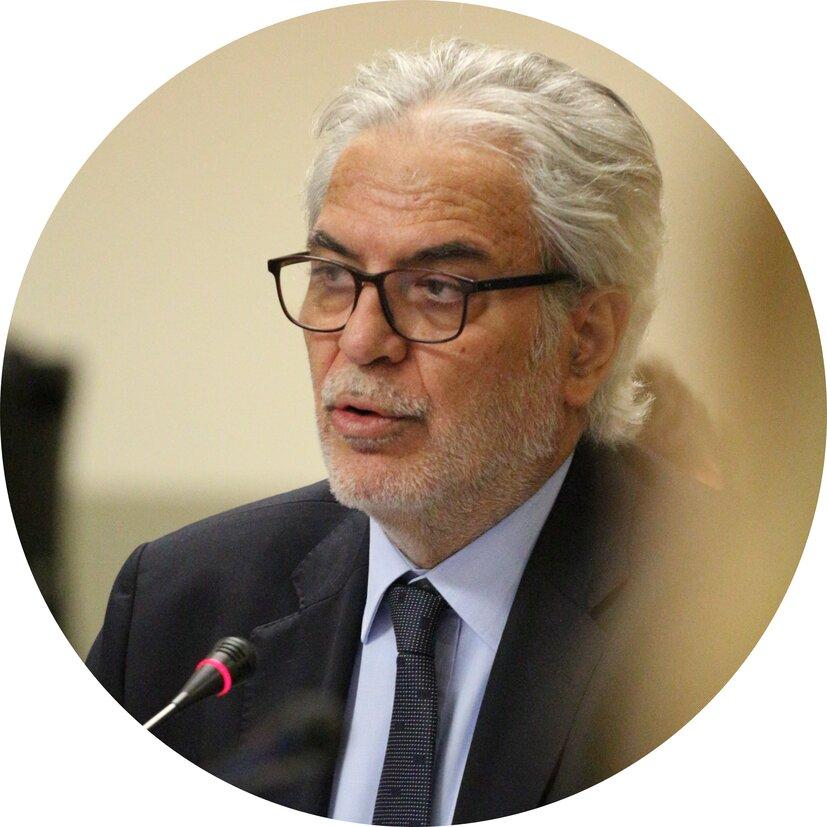Please help us improve PreventionWeb by taking this brief survey. Your input will allow us to better serve the needs of the DRR community.
“The climate crisis is already here, it's real” – and Greece is taking it seriously

Christos Stylianides, Greece’s Minister for the Climate Crisis and Civil Protection, tells PreventionWeb about his unique role, and how his Ministry is tackling adaptation and resilience.
Christos Stylianides, former European commissioner for humanitarian aid and crisis management, has been appointed the head of Greece’s newly established Ministry for the Climate Crisis and Civil Protection. Minister Stylianides is well known for leading the transformation and upgrade of the European civil protection system, by establishing the rescEU mechanism which allows European countries to request and receive help in times of emergencies.
PreventionWeb met with him at the first Action-Oriented Dialogue as part of the European Forum for Disaster Risk Reduction (EFDRR) Roadmap 2020-2030. The Ministerial Roundtable – organized jointly by Stylianides’ Ministry and UNDRR’s Regional Office for Europe and Central Asia – took place in Athens on 21 October 2022.
The event focused on accelerating the implementation of the Sendai Framework in the region, by sharing experiences, identifying solutions, and enhancing the political momentum and commitments to address the risks and impacts of extreme temperatures, heatwaves and wildfires.
We spoke with Minister Stylianides to discuss the importance of disaster risk reduction in tackling current climate change challenges in the Eastern Mediterranean region.
The climate crisis is not fake news
The Minister started by stressing that the “climate crisis is already here, it's real”. Business as usual, “is not an option” as “traditional methods” to tackle extreme weather events “don’t work anymore”.
“Changing nothing is really disastrous”, Stylianides says.
Unfortunately, the climate crisis and natural hazards are here to stay.
“This harsh reality cannot be ignored and underestimated”, the Minister says.
However, there is some good news: “There are solutions”.
Linking the climate crisis to civil protection is key. This simple yet innovative concept led Greek Prime Minister Mitsotakis to establish the Ministry for Climate Crisis and Civil Protection.
For Greece, the cost of inaction would be immense: the country faces many kinds of natural hazards. To reduce risks, the Greek government is taking action by developing the structures and mechanisms of the new Ministry.
“We could not wait any longer,” says Stylianides. “Something drastic had to be done.”
Interview @UNDRR How the Ministry for Climate Crisis & Civil Protection is tackling adaptation and resilience pic.twitter.com/emuQJPPPd5
— Χρήστος Στυλιανίδης - Christos Stylianides (@StylianidesEU) November 23, 2022
"A request I could not refuse”
When the Greek Prime Minister asked Stylianides to serve as the first Minister for Climate Crisis and Civil Protection of Greece, he didn’t hesitate to accept.
“It was a request I could not refuse,” he says.
The new Ministry meets the new needs in disaster risk management”, Stylianides says. The new structure brings to the forefront the causal relationship between the climate crisis and natural hazards.
To deal with the effects of extreme weather, he says, the new Ministry has two prerequisites: “defining the problem” in all regions of the country and “understanding its dimensions.”
The Ministry’s strategy rests on three pillars: prevention, preparedness and resilience.
To this end, the first thing the Ministry did was to overhaul the existing response system to natural hazards, so as to enhance measures and policies for prevention and preparedness.
This is “something that didn’t exist before”, Stylianides notes.
Minister Stylianides also stresses the importance of improving civil protection structures to handle worsening climate conditions and bureaucratic obstacles.
He is convinced that “time is of the essence” –the failure to proactively address the consequences of climate change will result in an enormous social, environmental and economic cost.
“The more we wait, the more difficult it will become to transform our societies and economies and make them climate resilient,” Stylianides says.
Risk reduction successes
Minister Stylianides notes that several interventions have already paid off in dealing with disaster risk at the national level.
First, the work being performed by the Ministry of Climate Crisis and Civil Protection complements the work done by the Ministry of the Environment, with close cooperation through synergies between the branches of government.
Second, in terms of wildfire risk, the Fire Brigade and the Forest Service are now working “hand in hand… for the first time in almost 25 years,” taking coordinated actions resulting in “good and encouraging results”.
These actions included clearing new forest areas and creating and maintaining new fire tracks.
Moreover, operations were empowered with forest commando units, additional forest patrols and systematic implementation of aerial surveillance.
“I think it was an excellent combination”, Stylianides says.
A new start
At the same time, the Ministry is continuously upgrading the coordination mechanisms, by:
- enhancing the role of the National Coordination Centre;
- including the scientific community to utilise their expertise; and
- developing the first national-wide database – this open database will cover all types of natural hazards and will be informed by expert advice.
To achieve this, the Ministry is collaborating with universities and research centres and has made “a new start” with local authorities on coordination, while taking steps to overcome bureaucratic obstacles and resolve overlapping.
“It is little bit boring” to mention these three pillars constantly, “but is the only way to deal with this unprecedented situation”.
“This is a holistic approach” which enhances collaboration and synergies at all levels – European, national, regional and local.
“It determines all of our actions and initiatives”, says Stylianides.

Solidarity in action
At the European level, Minister Stylianides is proud to mention rescEU, a key instrument of the European civil protection mechanism – as he was instrumental in its development.
He recounts the days when, as a European Commissioner, he saw a real gap in the civil protection system. After the deadly mega-fires in Portugal in 2017, Stylianides – supported by then-President of the European Commission Jean-Claude Juncker – proposed the establishment of rescEU.
During the 2022 summer of unprecedented heat and fires across Europe, the European protection mechanism and rescEU “were our key response instruments” says Stylianides. As result, for the first time in Greece, firefighters and equipment were prepositioned ahead of the blazes, reducing the fires’ destructive impacts.
The successful implementation of this pilot project led the European Commission to the decision to continue and advance it in the following years.
Action-oriented dialogue
The Eastern Mediterranean region is a hotspot for natural hazards, and the Greek Ministry for Climate Crisis is working towards facilitating regional cooperation.
The first action-oriented dialogue took place in Athens in October 2022, facilitated by the Hellenic Republic and the UN Office for Disaster Risk Reduction, to allow the acceleration of this critical cooperation.
“Regional cooperation is paramount in facing more effectively the impact of climate change in this hot spot area”, Stylianides says.
“The climate crisis which is already here on our doorstep makes it even more necessary to work together with a common strategy”, Stylianides explains.
“Togetherness is a key word, especially in this very demanding field”.
Tackling emerging risks such as extreme temperature and heatwaves, while developing prevention policies that move beyond the traditional approach in disaster response, can be addressed through regional cooperation, under the “umbrella of the European Union civil protection mechanism”.
Collaboration must start now
Minister Stylianides notes five concrete expectations from the action-oriented dialogue:
- Preventative mechanisms should be empowered to seek new innovative techniques for tackling unmatched climate conditions.
- Opportunities must be explored to strengthen prevention efforts through regional intergovernmental institutions.
- Partnership with key stakeholders must be improved.
- Further ways to exchange good practises, experience and knowledge should be developed.
- The academic community’s rich scientific work must be utilised.
“I also want to stress the importance of risk governance” says Stylianides.
The Athens dialogue comprised technical sessions during which participants exchanged lessons learnt, and provided recommendations on how to advance regional cooperation, feeding into an outcome document presented at the Ministerial Roundtable.
“We need action. We have to turn words into action through regional dialogue and cooperation in all aspects of our collaboration.”
This collaboration has “to start now,” Stylianides urges.
“Maybe it was better to start yesterday, but even just now” it is very important “for us and for our region”.
 Christos Stylianides has been serving as Greece's Minister for the Climate Crisis and Civil Protection since September 2021. From 2014 to 2019 he served as European Commissioner for Humanitarian Aid and Crisis Management. During his tenure as Commissioner, he established the rescEU mechanism, which strengthened disaster risk management cooperation between countries within the European civil protection system.
Christos Stylianides has been serving as Greece's Minister for the Climate Crisis and Civil Protection since September 2021. From 2014 to 2019 he served as European Commissioner for Humanitarian Aid and Crisis Management. During his tenure as Commissioner, he established the rescEU mechanism, which strengthened disaster risk management cooperation between countries within the European civil protection system.
Editors' recommendations
Explore further
Please note: Content is displayed as last posted by a PreventionWeb community member or editor. The views expressed therein are not necessarily those of UNDRR, PreventionWeb, or its sponsors. See our terms of use
Is this page useful?
Yes No Report an issue on this pageThank you. If you have 2 minutes, we would benefit from additional feedback (link opens in a new window).